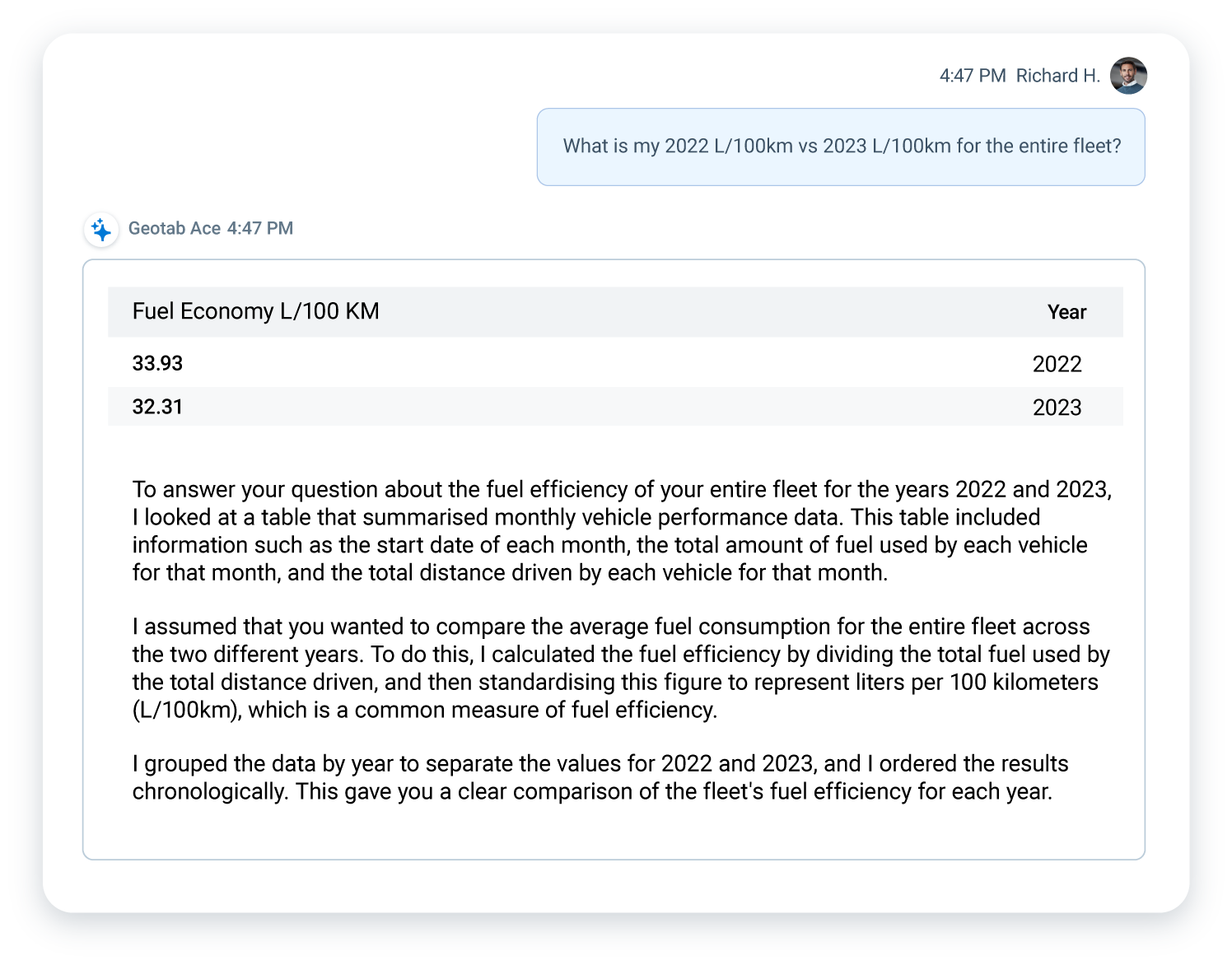Data security and privacy with Geotab Ace
Learn how Geotab Ace™ keeps your fleet data safe with advanced privacy and security measures, providing powerful AI-driven insights.


Advances in generative AI are changing how we interact with and understand data. And while Gen AI systems offer incredible benefits, they also introduce new challenges and concerns, especially regarding privacy and security. A 2024 report1 shows that 74% of companies report significant impacts from AI-powered threats, while 48% of security professionals express concerns about data privacy and security when using AI tools.
At Geotab, we recognize these and other concerns and are committed to implementing comprehensive responsible AI, privacy and security protocols for our AI models, including Geotab Ace™, our innovative AI assistant powered by Gen AI. By prioritizing responsible AI, Geotab Ace protects your sensitive information while delivering powerful insights to support your fleet management priorities.
The challenges of Gen AI models
Gen AI systems, particularly those relying on large datasets, present unique privacy and security challenges. The extensive use of these systems can inadvertently expose sensitive information, leading to various harms2:
Misinformation/hallucinations – Large Language Models (LLMs) are known to sometimes generate incorrect or misleading information. These issues arise when the AI produces confident but false outputs, which can be problematic if relied upon for key decision-making. It’s very important to implement checks to validate AI-generated information and maintain data accuracy.
Abuse/Misuse – There is a risk of malicious users exploiting AI models to produce harmful outputs or conduct unauthorized tasks. For example, someone might manipulate the AI to generate biased or inappropriate responses. Strong security protocols and ethical guidelines help prevent this kind of misuse, protecting the integrity of AI systems.
Transparency and explainability – AI systems must be transparent and explainable to help users detect and understand errors. Users should be able to see how the AI arrived at a particular conclusion and grasp the decision-making process. Without transparency, it becomes difficult to trust and verify AI outputs, leading to potential misuse or misunderstanding of the AI’s capabilities.
Human agency – Users should always remain the ultimate decision-makers, fully understanding the AI’s outputs. AI should assist rather than replace human judgment, allowing users to retain control over critical decisions. Maintaining human oversight prevents over-reliance on AI and factors ethical and contextual considerations into decisions.
Data rights – There are concerns about the ownership of data used and generated by AI models. Clear data rights must be established to protect customer data and prevent misuse. Keeping data as the property of the customer and limiting its use to its intended purpose is key.
Privacy and security – AI models must protect user data from being leaked or misused. Strong security measures throughout the data lifecycle are important. Compliance with data protection regulations and standards helps maintain user trust and protects sensitive information from unauthorized access.
Addressing these challenges requires a multifaceted approach. At Geotab, we focus on several key areas to protect user data.
How Geotab protects your data
Human-centric design
Geotab Ace™ is developed with the fleet user in mind, keeping human decision-makers in control of the data. The system helps users by providing clear and understandable data insights without making autonomous decisions. Feedback mechanisms are integrated, allowing users to report issues and suggest improvements. Geotab emphasizes transparency in AI operations by breaking down SQL queries in plain language, helping users understand the data processing steps.
For example, Geotab Ace explains what it understood from the user's request, what assumptions it made, and where it sourced the data. Transparency at this level helps users verify the system's accuracy and provides clarity on how the data is being processed and used.

High-quality data collection
Reliable AI starts with quality data. Geotab has invested heavily in collecting high-fidelity data, which allows the insights generated to be accurate and dependable. By focusing on precise data logging and extensive testing, Geotab Ace provides trustworthy information that users can rely on.

Geotab’s commitment to high-quality data collection includes thorough regression testing and creating an extensive database of question-answer pairs to improve the system’s accuracy. A strong foundation supports consistent and reliable AI performance so users get accurate insights based on precise data.
Ethical hacking and security testing
To address potential threats, Geotab uses ethical hacking and thorough security testing. A proactive approach helps find and fix vulnerabilities, keeping the system safe from misuse and unauthorized access. Geotab regularly updates its security measures to stay ahead of emerging threats, so the AI system remains secure and trustworthy.
Geotab’s ethical hacking practices include red teaming tests, which evaluate the system’s response to various trustworthiness, data privacy and security challenges. These tests confirm that the AI system can handle a wide range of potential threats while maintaining data integrity and security.
Enterprise-grade deployment framework
Geotab Ace is built on high-quality, enterprise-grade technology. Using Azure Cognitive Services – a comprehensive suite of AI tools and APIs provided by Microsoft — the system adheres to industry-leading security standards. Data remains within the secure Geotab environment, and strict access controls mean only authorized users can access sensitive information. Geotab also upholds that customer data is never used to train the AI models, preserving data ownership and privacy.
The legal framework in place maintains that all data remains the property of the customer and is never used beyond its intended scope. Geotab also uses secure querying methods that prevent the AI from accessing actual data locations or database structures, to further support data privacy.
Privacy and data protection measures
Purpose limitation and data minimization
Geotab Ace uses only the necessary customer data and insights provided by Geotab systems. Users are advised to avoid entering sensitive or irrelevant information to reduce the risk of including Personally Identifiable Information (PII) or other confidential data. To minimize storage risks, any data retrieved from databases is not saved, lowering the chance of PII being stored in chat history.
Data protection
Any PII in stored prompts is anonymized and hidden before being used for product improvements. Results from Geotab databases are only returned directly to the user to further support data privacy. This setup prevents unauthorized access to any data entered into the system so data is not available to the AI model during interactions or future development.
No customer data sharing with third-party
Geotab does not share telematics data with Azure Cognitive Services (Azure Open AI) or any other third parties; only the contents of the question/query are shared. Azure OpenAI services are used in line with Microsoft’s strict data privacy standards. Customer data remains within the secure Geotab data storage environment.
Data access controls
The chat model's access to internal databases and chat history is consistent with the user’s access permissions, providing an end-to-end solution for data access control. Regular security testing during development and ongoing checks help maintain proper access control levels.
Upholding data security and privacy in AI fleet management
As AI continues to reshape fleet management, Geotab remains committed to data security and privacy. By adopting a multifaceted approach, Geotab Ace™ protects your data while delivering powerful AI-driven insights.
To learn more about our commitment to responsible AI, read our detailed Responsible AI & Privacy Whitepaper.
Ready to see Geotab Ace in action?
Schedule a demo to see how our innovative AI assistant can enhance your fleet management while keeping your data secure.
References
1 “State of AI Cyber Security 2024”, DarkTrace, 2024.
2 Scarpino, J. “Evaluating Ethical Challenges in AI and ML”. ISACA, July 1, 2022.
Subscribe to get industry tips and insights
Table of Contents
Subscribe to get industry tips and insights
Related posts

What is government fleet management software and how is it used?
April 10, 2025
3 minute read

Fleet data and analytics: guide for informed fleet operations
March 24, 2025
4 minute read



Why driver incentive programs fail and what fleets can do about it
February 27, 2025
5 minute read
